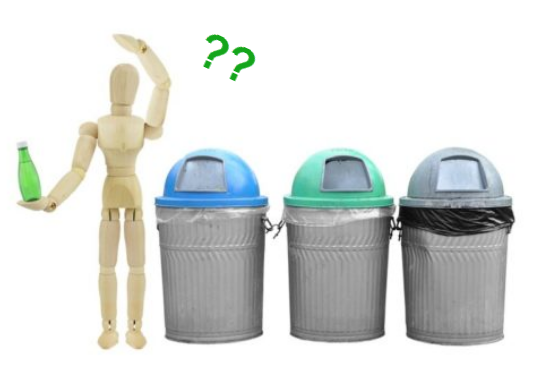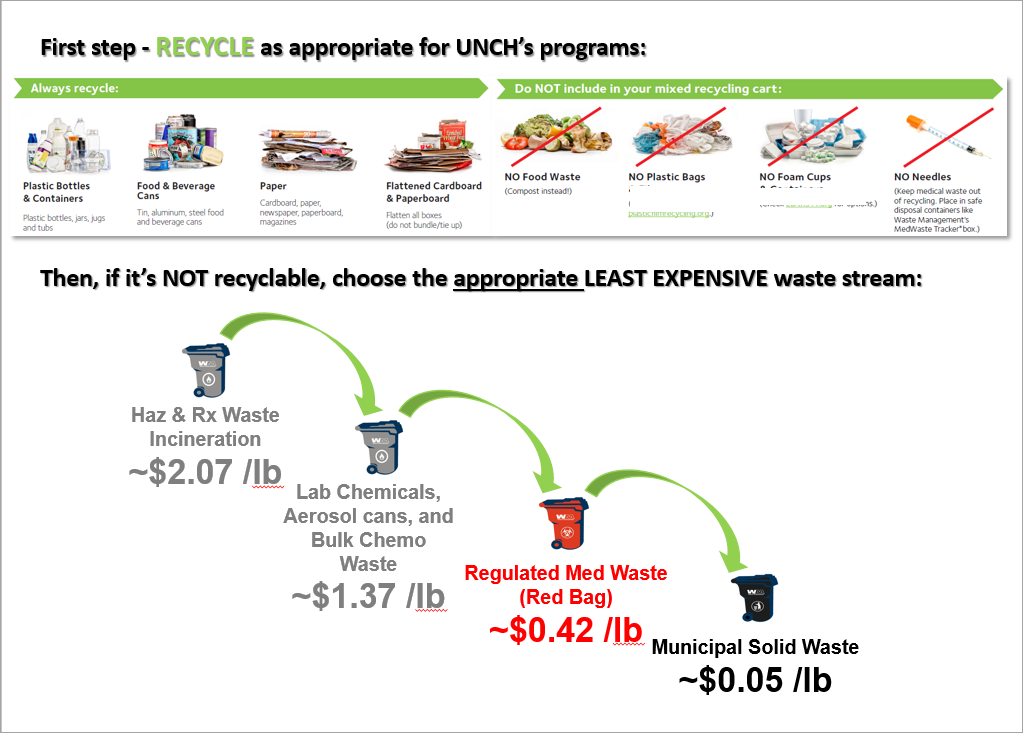Learn more about what wish-cycling is, how to avoid it, and how to ensure that the waste your department produces is disposed of properly and cost effectively.

Learn more about what wish-cycling is, how to avoid it, and how to ensure that the waste your department produces is disposed of properly and cost effectively.

By Brian Nelson, Sustainability Advocate, UNC Health Care
You know those times when you’re standing in front of both a trash can and a recycling bin and you’ve got an item in your hand – maybe it’s the plastic wrap from your sandwich or your coffee cup from Starbucks – and you wonder which bin you should use? And since you know that recycling is the right thing to do and you’d like to do your part, you just aren’t sure – so you go with “I’ll just recycle it and if they can’t recycle it, they’ll just throw it away for me”. Sound familiar?
Well, you certainly get an “A” for intention and effort, but you probably don’t know that this actually makes things worse! Read here to learn why.
This “do I or don’t I” recycling question is one that we all face on such a regular basis that recyclers actually have a term for it: it’s called “wish-cycling” for the practice of tossing questionable items in the recycling bin while hoping they can be recycled. But, as well-intentioned as the practice is, wish-cycling ends up costing the recycling company time, it increases UNC Health Care’s costs, and it can even sometimes create far more waste than if we hadn’t wish-recycled in the first place. Here’s how:
Wish-cycling Wastes Time
Recycling facilities manage many tons of waste per day with highly complex machinery that automates a good deal of the process. When items are included with the recycling that should not have been – like garden hoses, waxed coffee cups, and window blinds (really!) – these often jam up the machinery and cause the facility many hours of processing time to fix the issues and operations come to a halt. This then forces a more costly and slower manual separation process and wastes a ton (pun intended) of time.
Wish-cycling Costs More
Not only does downtime at the processing facility increase their processing costs that eventually get passed onto us, but a recycling waste stream that is contaminated with improper items can also potentially jeopardize the plant operators’ relationships with the commodities market and put our future recycling ability at risk.
Collection is not the same as recycling.
One key thing that many don’t realize about any recycling program – be it here at UNC Health Care or at home – is that recycling companies can only collect items for which there is a buyer. That means that as good as our intentions are, we can’t recycle everything and while many things can technically be recycled, not everything is accepted because processors aren’t able to resell it on the commodities markets to recoup their costs. This then leads to the third reason why wish-cycling can be more harmful than simply throwing that item in the regular trash.
Wish-cycling Creates More Waste
You may have seen in the news that China is no longer taking American plastic and paper waste because it’s too contaminated with improperly disposed-of items, so our waste companies are increasingly struggling to find buyers for our recycled waste. The problem with wish-cycling is that improperly disposed-of waste contaminates the various streams that are still able to be collected. And, as a result, entire loads of could-have-been recycled materials end up going to the landfill because it’s just too expensive to sift through that contaminated waste.
By wish-cycling, we – ironically – end up creating MORE waste than if we’d done nothing and just thrown that trash away in the regular bin because processors are then having to pay to dispose of both regular trash and contaminated recycling materials at landfills.
What’s a Wish-Cycler to Do?
The best thing we can all do here at UNC Health Care is to ensure that you are using the appropriate waste streams as you discard your personal trash and office wastes. Often, we either just wish-cycle or we throw away items in the nearest bin – regardless of that bin’s intended purpose – and this can cost us WAY more than it should. Using the correct disposal stream reduces the contamination across our recycling streams and not only saves us money now, but also helps protect our ability to continue recycling in the future.
While there is of course a cost associated with managing and operating our recycling program, check out this diagram to see the huge differences in costs for our different types of waste:

The takeaway from this chart is that taking a few moments to ensure that you are using the correct waste stream can bring huge cost savings considering how much waste we produce on a daily basis!
Key to the success of our waste programs are our Environmental Services (EVS) and our Environmental Health & Safety (EHS) teams who work behind the scenes to manage the many types of waste that we produce during our operations to take care of North Carolina. Our EVS group has been working in partnership with Waste Management Sustainability Services since 2016 and our EHS group works with UNC’s EHS to optimize our recycling and waste disposal services to support our entire campus. We’ve made great strides the past few years and we now have data to prove it (keep an eye out for this in a future article) – but, with a nod to continuous improvement, we can always get better!
If you have questions about our recycling programs; about waste that your office produces to determine the correct ways to dispose of it; or if you need assistance with adjusting the frequency of your bin pick-ups, please contact our Waste Management leads:
UNC Medical Center / Caldwell / UNC Physicians Network / Rex
Andrew Daoust at 877-892-7838, Option 3
Pardee / School of Medicine / Rockingham / Nash / Wayne / Johnston / Lenoir / UNC Faculty Practice / Chatham
Mario Pinon at 877-892-7838, Option 5
If you are unable to reach Andy or Mario directly and your need is urgent, call the Customer Service Line and choose option 0.
For lab and other chemical wastes, aerosols, bulk chemotherapy wastes, and for the recycling of various batteries (alkaline, lithium, nickel-metal hydride, and nickel cadmium)
Tim Wisner, UNCH EHS Safety Officer at 984-974-0928
This is the first of a series about our recycling program. Stay tuned for the next article for a breakdown of what’s both appropriate and not appropriate for our various waste streams. Should you have any questions about this topic or other sustainability efforts at UNCH, click here to contact Brian Nelson, UNCH Sustainability Advocate for assistance.
Article sources:
3 Big Reasons “Wish-cycling” Is Always a Bad Idea https://earth911.com/living-well-being/wish-cycling/
The Dangers of “Wishcycling” http://mediaroom.wm.com/the-dangers-of-wishcycling/